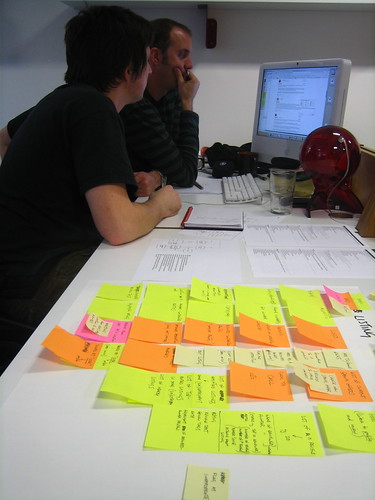
I spent Friday in the Midlands with a big engineering multinational, looking at the topic of project knowledge management plans.
One of the push-backs we often get when we introduce KM plans is “why do we need a plan? Any good engineer will naturally do all the learning they need; surely a KM plan or learning plan is just added work for no added value?”
My usual reply is to draw the analogy with a risk management plan. Any good engineer will naturally be aware of risk, and will put in place mitigations against all the risks he or she can think of, but there is still value in the whole team sitting down and discussing the risks to the project, and developing a risk management plan to address those risks. By adding structure, and by involving the whole team, the project comes out with a better approach to risk.
The same is true for knowledge. There is value in the whole team sitting down and discussing the knowledge needed by the project, and developing a plan to acquire that knowledge. By adding structure, and by involving the whole team, the project comes out with a better approach to learning.




4 comments:
Sometimes it's easier to integrate the elements of a KM plan within an existing plan rather than have a separate --potentially disconnected-- plan. If project teams are already overburdened with required planning document, I'd recommend inserting KM elements where appropriate rather than a separate plan. That doesn't mean you shouldn't have a stand-alone KM planning process.
I agree it's easier, Barbara, and certainly the actions from the KM plan should go in the project action tracker.
However the risk is that KM activity loses visibility if there is no plan to follow and monitor against. The great thing about a KM plan, like a risk management plan, or a quality plan, is that it becomes both visible and auditable. "Show me how you are doing against your KM plan" can then become a valid management question, which cannot be asked if KM activity is dispersed in other places.
I also worry that the message you send is "if you are overburdened, then don;t worry about KM". KM is a solution to overburdening, not an added extra!
I didn't mean to suggest that "if you are overburdened, don't worry about KM," but rather, if there is no "requirement" to have a KM plan, the KM team has to be flexible and somewhat realistic about what can be achieve, depending on each project. In some cases a separate project plan may work, in others, KM elements integrated into existing auditable documents may be the best approach.
Ah, I see! Sorry!
If there is no requirement for a KM plan, then yes, be flexible. The ideal is to show enough value that KM plans become a requirement, at least for the larger projects
Post a Comment